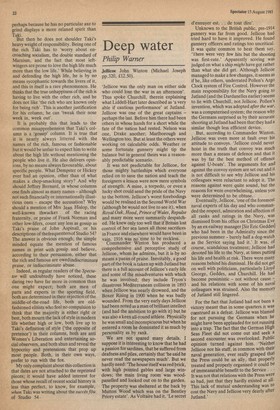Deep water
Philip Warner
Jellicoe John Winton (Michael Joseph pp.320, f12.50).
`Jellicoe was the only man on either side who could lose the war in an afternoon'. Thus spoke Churchill, therein explaining what Liddell-Hart later described as 'a very able if cautious performance' at Jutland. Jellicoe was one of the great captains perhaps the last. Before him there had been others in whose hands for a short while the fate of the nation had rested. Nelson was one, Drake another; Marlborough and Wellington too. But at least the others were working on calculable odds. Weather or some fortunate gunnery might tip the balance but in general theirs was a reasonably predictable scenario.
It was not predictable for Jellicoe, for those mighty battleships which everyone relied on to save the nation and teach the foreigners a lesson were now mere symbols of strength. A mine, a torpedo, or even a lucky shot could send the pride of the Navy to the bottom. Jellicoe's worst forebodings would be realised in the Second World War (although he would not live to see it), when Royal Oak, Hood, Prince of Wales, Repulse and many more were summarily despatched. He knew only too well that if Britain lost control of her sea lanes all those sacrifices in France and elsewhere would have been in vain. 1916 was no time to be reckless.
Commander Winton has produced a comprehensive and perceptive study of Jellicoe, whom he admires, but it is by no means a paean of praise. Inevitably, a good part of the book is taken up with Jutland but there is a full account of Jellicoe's early life and some of the misadventures with which he was involved; they include Tryon's disastrous Mediterranean collision in 1893 when Jellicoe was nearly drowned, and the Boxer Rising in 1900 when he was badly wounded. From the very early days Jellicoe had been noted as a man of brilliant intellect (and had the ambition to go with it) but he was also a keen all-round athlete. Physically he was small and inconspicuous but when he entered a room he dominated it as much by personality as by rank.
We are not spared many details. I suppose it is interesting to know that he had a passion for sardines, that he suffered from deafness and piles, certainly that 'he said he never read the newspapers much'. But we hardly need: 'The house itself was red brick, with high pointed gables and large windows; the main living room was woodpanelled and looked out on to the garden. The property was sheltered at the back by Mutton Wood which was on the Bentley Priory estate'. As Voltaire had it, 'Le secret d'ennuyer est. . . de tout dire'.
Unknown to the British public, pre-1914 gunnery was far from good. Jellicoe had tried hard to have it improved. He found gunnery officers and ratings too uncritical. It was quite common to hear them say, "There were very few hits but the shooting was first-rate.' Apparently scoring was judged on what a ship might have got rather than what she did get. Although Jellicoe managed to make a few changes, it seems as if he, like others, underrated Pollen's Argo Clock system of Fire Control. However the main responsibility for the Navy going to Jutland (and the Dardanelles earlier) seems to lie with Churchill, not Jellicoe. Pollen's invention, which was adopted after the war, was a computerised system; the reason why the Germans surprised us by their accurate shooting at Jutland had been that they had a similar though less efficient device.
But, according to Commander Winton, Jellicoe was even more at fault over his attitude to convoys. 'Jellicoe could never hoist in the truth that convoy was much more than a means of defence and that it was by far the best method of offence against U-boats'. The arguments for and against the convoy system are set out and it is not difficult to see why Jellicoe and his colleagues were reluctant to adopt it. The reasons against were quite sound, but the reasons for were overwhelming, unless you were determined to be obtuse.
Eventually, Jellicoe, 'one of the foremost naval experts of his day and who commanded the respect, admiration and affection of all ranks and ratings in the Navy, was dismissed from his office on Christmas Eve by an ex-railway manager [Sir Eric Geddes] who had been in the Admiralty since the previous summer barely half a dog-watch as the Service saying had it.' It was, of course, scandalous treatment; Jellicoe had devoted his life to the Navy, at times putting his life and health at risk. There were many reasons behind his dismissal. He did not get on well with politicians, particularly Lloyd George, Geddes, and Churchill. He had become pessimistic not without cause and his relations with some of his naval colleagues was strained. Also the memorY of Jutland still lingered.
For the fact that Jutland had not been a victory meant that in some quarters it was construed as a defeat. Jellicoe was blamed for not pursuing the Germans when he might have been applauded for not running into a trap. The fact that the German High Seas Fleet did not come out and seek .a second encounter was overlooked. Public opinion turned against him. 'Neither Jellicoe nor his staff, in common with their naval generation, ever really grasped that the Press could be an ally, that properly treated and properly organised it could be of immeasurable benefit to the Service . • • It was not that relations with the Press were so bad, just that they hardly existed at all. This lack of mutual understanding was to cost the Navy and Jellicoe very dearly after Jutland.'


































 Previous page
Previous page